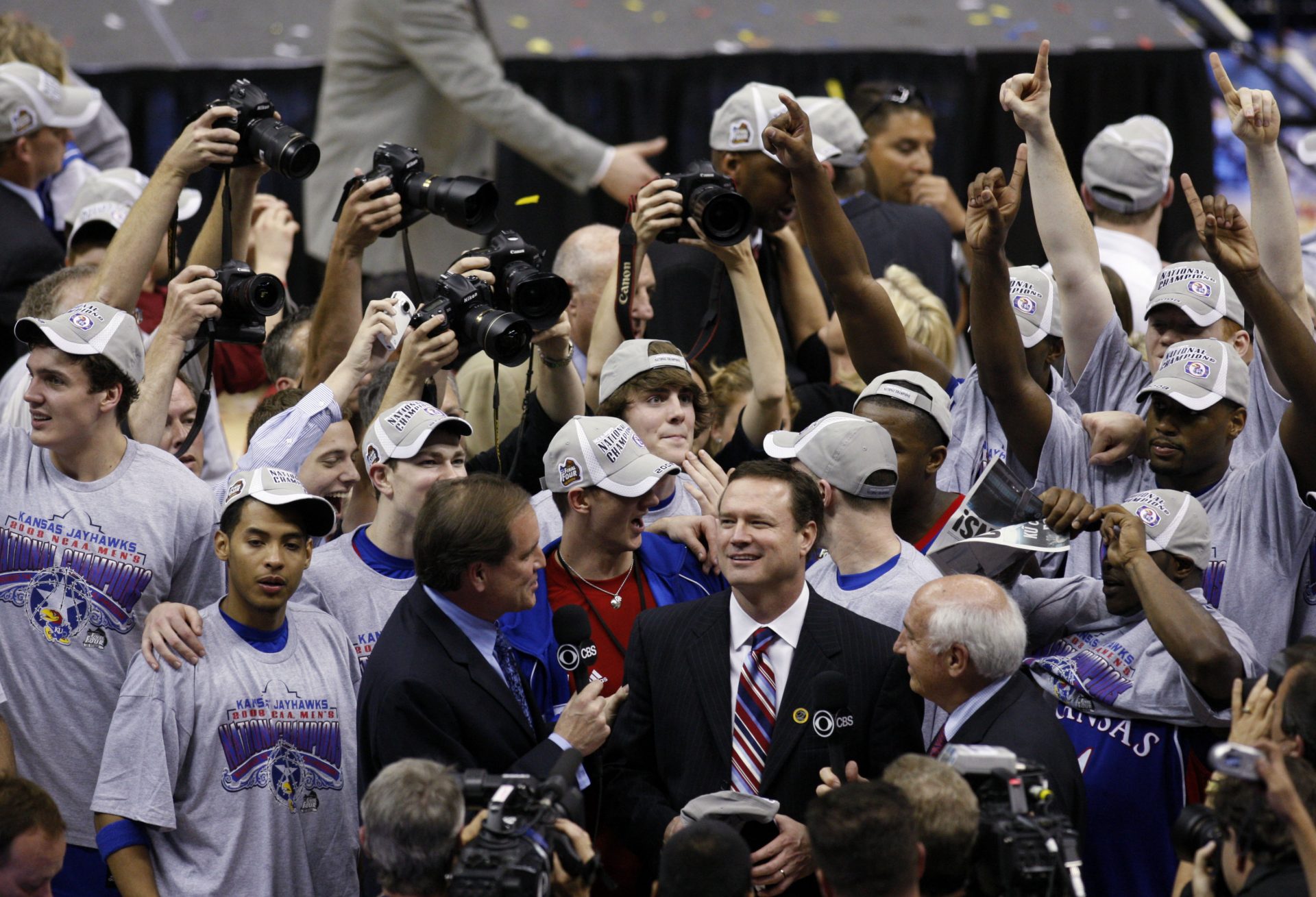Kansas Basketball’s coaching tradition is a model of stability and greatness. Over more than 120 years, only eight men have officially led the Jayhawks, each leaving a unique mark on the program and the sport.
Their collective impact has built a legacy of championships, innovation, and excellence that defines Kansas basketball. Let’s examine this incredible feat by the Jayhawks.
Rock Chalk Dynasty: A Look at Kansas Basketball’s Eight Coaches
James Naismith, 1898-1907
Record: 55-60, .478
James Naismith, the founder of basketball, coached Kansas from 1898 to 1907. He’s the only coach in KU history with a losing record (55-60), but his legacy remains unparalleled. Naismith’s vision and core values established the pillars of the program and the sport, making his spirit eternal at Kansas and beyond.
Phog Allen, 1907-1909 / 1919-1956
Record: 590-219, .729
Phog Allen, the so-called “Father of Basketball Coaching,” was at the helm at Kansas for 39 seasons, winning 590 games and 24 conference titles. He helped develop the NCAA Tournament and established basketball as an Olympic sport.
Allen’s coaching tree is a royal generation of its own: Adolph Rupp, Dean Smith, and he won three national championships, including an NCAA title in 1952.
William O. Hamilton, 1909-1919
Record: 125-59, .679
William O. Hamilton coached Kansas from 1909 to 1919, resulting in a 125–59 win-loss record. The Jayhawks won five conference championships while he was in charge.
Hamilton was a constant factor of stability and success throughout the ten years and spearheaded the Jayhawks’ early effort to be competitive and among the outstanding brands within the sphere of college basketball. He took over from Allen after the 1908-09 season and, after resigning, gave the helm back to Allen in 1919.
Dick Harp, 1956-1964
Record: 121-82, .596
Dick Harp, a former Kansas player and assistant, was the head coach for eight years, from 1956 to 1964. His team reached the national championship game in 1957 but lost to North Carolina.
His boys twice became conference winners. Owning up to the high expectations that Wilt Chamberlain developed, Harp, at the same time, ensured that the success of the program’s excellence in his tenure.
Ted Owens, 1964-1983
Record: 348-182, .657
Ted Owens was the head coach of Kansas from 1964 to 1983, and during his 19-year tenure, he compiled a 348–182 win-loss record.
Owens made the Final Four twice, bagged six conference crowns, and was named the Basketball Weekly Coach of 1978. His teams were still fierce, and his coaching impact can still be seen consistently at the national level.
Larry Brown, 1983-1988
Record: 135-44, .754
Larry Brown’s spell with Kansas lasted five years from 1983 to 1988. In 1988, he won the NCAA title and led the team to two Final Fours, ending his tenure with a win-loss record of 135–44.
RELATED: Is Jacque Vaughn the Heir to Bill Self? A Look Back at His Coaching Career So Far
His coaching tree is just magical, with the number of successful coaches it has produced, and his 1988 title is one of the most memorable stories in college basketball to date.
Roy Williams, 1988-2003
Record: 418-101, .805
Roy Williams coached the Jayhawks from 1988 to 2003, compiling a record of 418 – 101. He led Kansas to four Final Fours and nine conference titles.
On two separate occasions, Williams was selected as the national Coach of the Year, and he didn’t miss the NCAA Tournament for 14 years, but he still couldn’t win a national championship at KU.
Congratulations to Roy Williams on being inducted to the Kansas Sports Hall of Fame this past weekend 🌻 pic.twitter.com/qOq0L8I26u
— Kansas Jayhawks (@KUAthletics) October 3, 2022
Bill Self, 2003-Pres.
Record: 579-138, .808
Bill Self has been the head coach of Kansas since 2003. With over 590 wins, he is the program’s winningest coach. He has taken the Jayhawks to two NCAA titles, three national championship games, and 14 consecutive league titles.
Self’s unbroken track record of top-notch performance and flair for change has enabled Kansas to be the team to beat in college basketball.
College Sports Network has you covered with the latest news, analysis, insights, and trending stories in college football, men’s college basketball, women’s college basketball, and college baseball!


